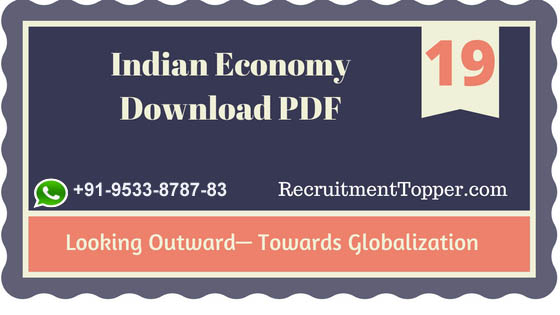Indian Economy | Looking Outward – Towards Globalization Download PDF
Contents
So far, we have discussed about the domestic economy. What does it mean to look outward? Looking outward is to look at the Rest of World.
Need to Look Outward
The need to look outward brings us to the importance of trade and various currencies. Any trade with other countries would involve receipts and payment in currencies other than home currency. As an inward looking economy focused on domestic sector, the home currency was important. Trade will involve imports (goods coming into the country) and exports (goods going outside the country). All payment for imports has to be in foreign currency and all receipts in foreign currency.
The need to look outwards thus is to look for newer markets and at the same time allowing foreign currency to come to pay for imports, required for developmental needs domestically.
Need For Imports and Exports
It is well-known that there are different countries in the world with different resource endowments, levels of development, income levels, diverse languages and cultures. No one country can be said to have the best of everything in the world i.e., there is a ‘relative deficit’ in each country which could either be resources, or people, or knowledge or technology or markets or even goods and services differing in terms of their range and superiority.
The needs of a country keep on changing continuously. It also undergoes a change with increasing population pressure and increased income levels, requiring optimal and efficient allocation and utilization of scarce resources depending on the resource endowments of different countries.
Basically, there are two different kinds of resource endowments in an economy—labour and capital, This is ‘relative resource endowment’ i.e., though every country will have both but relatively one would be more than the other across countries. India, for example, has relatively large and abundant pool of labour than capital. Similarly Germany has relatively more capital than labour. Thus, labour would be cheap in India, whereas capital would be cheap in Germany.
Thus, production process in India would be labour-intensive and such goods would be cheaper in India. What about labour-intensive goods in Germany? They will be more expensive given their relative scarcity and higher cost of labour in comparison with India. What about capital-intensive goods? The same, it will be cheaper to produce capital¬intensive goods in Germany given their relative abundance of capital than India where capital is scarce.
Thus, India producing capital-intensive goods and Germany producing labour-intensive goods is not efficient utilization of resources, sub-optimal and resulting in higher cost in both economies. Thus, the need arises for trade and to look outwards for an economy.
A better solution for both the countries, India as well as Germany would be that: let India produce labour-intensive goods (as it is relatively cheaper in India) and export to Germany while import capital-intensive goods from Germany (as it is relatively cheaper in Germany). ‘
This is what is known as Theory of Comparative Advantage, which states that a labour¬intensive country will export goods over which it has a comparative advantage (labour-intensive goods by India) and import goods over which it has a comparative disadvantage (capital¬intensive goods from Germany).
The relative differences in resource endowments then become the basis of trade for efficient allocation and utilization of resources resulting in economic gains for trading countries. Thus, no trading will only lead to growing inefficiencies, high costs, burden of inflation besides lop-sided development. Trading solely will allow for better addressing the needs of development, through efficient allocation of resources, reducing costs, increasing income of economies which is also known as ‘welfare gains’ for both the countries,
As long as, an economy is looking at quantities of what is being produced, focused on creating capacities, meeting the basic needs of its population and the economy and issues such as efficiency, quality not on priority a country can afford to ignore trade. However, not indefinitely, as costs would gradually build-up, making economies high cost, uncompetitive given the high levels of inefficiency and chinks in the economy would start to appear of a high-cost, caught in a low-growth cycle, economy unable to meet the demands of growing population and the needs of higher growth.
Flip Side to Trade
Yes! there can be a few perceived fall outs of trade. First, it could come in the way to build a self-reliant economy bring back dependence, on economies memories of the exploitative colonial and imperial rule.
Secondly, trade strictly based on comparative advantage may not happen with each country having own national priorities and in conflict with trade based on resource endowments.
Thirdly, there could be restrictions to trade distorting comparative advantage. Similar to levy of import duties, also known as tariff and non-tariff barriers to trade in the form of quotas, discrimination and other protectionist measures. These aspects will be examined in detail while discussing WTO. ‘
The flip sides can be resolved only through greater openness, firm determination and resolve of economies and breaking the belief that trade is detrimental and on the contrary, they will provide for welfare gains. Trade is inevitable for economies wanting to chalk out new growth paths and reflects a win-win situation for all the trading partners, better allocation of scarce resources, opening newer markets and resulting in long-term gains for economies.

Leave a Reply